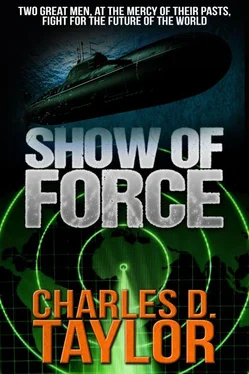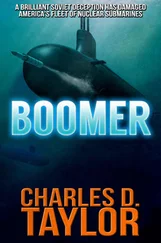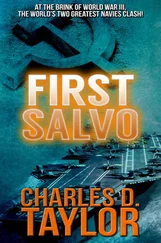"It's a blockade, with a great deal of similarity to the tactics we employed in Cuba in 1962. The tactics are the same, except that they are denying us here secure contact with Washington via the fire damage. The Russians apparently feel that if the U.S. is forced to deal directly from Washington, with silence and no mediation on this end, that they'll force indecision on the part of the President and world opinion can then gain them the upper hand."
"Wow, that's heavy stuff," one of the men muttered to another beside him.
"Why," asked another, "couldn't we utilize communications systems from other embassies? Friends, like the Canadians or British, or even neutrals like Switzerland or Sweden? They should have secure linkage with their own people in Washington."
"We considered that earlier this evening," Collier answered. "Ambassador Simpson even discussed this with some of his contacts at those embassies. But, if you need an example of successful infiltration of a staff, don't look any farther than right here. I'm pretty sure that fire a few hours back was started by people working here. If we have that little security on our own staff, imagine what we can expect with the others, friends or not.
"But that's a good question, Jessie. Don't get me wrong. We'll use the other embassies for general administrative messages and some direct voice contact, but we'll be damn careful what's carried. We do want the Russians to think we're going to use our friends and we're already beginning to set up a system. But that's to make them feel they've been entirely successful here. They don't know what we've got in this room, and this is the one ace we still have up our sleeves. As long as this all remains political rather than military, let them think they've been successful."
Collier looked at his watch. It was a bit after one in the morning and almost time for Carter to show up. He had been at a meeting of the Joint Chiefs with the CNO (Chief of Naval Operations) at which the President and his advisors were briefed on what had occurred to date. Collier knew that Carter would be looking for instructions to pass on to Moscow from that important meeting, for he and the ambassador might have to operate in the dark sooner than expected.
"Ambassador Simpson should be here shortly," Collier continued. "I explained most of the military situation to him this evening, and he will now be working directly with me until a solution is reached. Our job in Moscow will be to convince the Russians that what has occurred in the Indian Ocean is a fait accompli." He paused, then, "We want them to think it's too late for them to stop the installation at Islas Piedras and that military action will simply be a provocation to all-out war. I don't know myself how much more time we need at Islas Piedras, but I do know that Washington will be trying to convince the world that it is nothing but a replenishment base, similar to Holy Loch in Scotland."
"What are we planning to throw up against them, sir?"
"I know that we have been assembling a task force from a variety of ships that were sent out to act independently during the last few weeks. They've been in the Red Sea, off the African coast, and some were as far away as India or operating off the west coast of Australia. Nimitz is the flag, and I know a few of the Virginia-class cruisers are around, along with at least a half dozen attack subs out there. It was well planned a long time ago. There's a lot of nuclear power and not too much need for a replenishment force. But right now, I think you understand how much I'm going to be depending on you, and what you're going to have to do for God knows how long. A lot of people are relying on us."
As he finished, Ambassador Simpson appeared, visibly shaken for the first time in his life. "Good morning, Bob." He looked around the room first, then apparently realized he could talk openly in front of Collier's men. "I placed the entire staff on an emergency basis right after the fire. I would think at this point you probably have even more to tell me about the military situation. When I'm able to make a report, I'm going to mention that my position is too critical for me to have been kept in the dark about certain things that have taken place outside this country recently."
"I can assure you that a good deal of what's happened wasn't the Navy's fault, sir. I felt that you should have been involved long before, certainly when intelligence first learned of what the Russians knew about Islas Piedras. But the President, or his staff, have given us specific orders, which we've had to follow for the time being." He went on to elaborate on the details he had just finished with to his own men. Then he explained the call he was now waiting for.
The ambassador looked pensive for a moment, knitting his brows. "Bob, they've really placed me in a tough position. I've been getting indications in the daily meetings I've had at the Kremlin the past week that there was something I should know. By now, they must feel I'm either part of the whole scheme, or that perhaps I'm the dumbest ambassador they've had to deal with. You and I are going to have to work more closely together from now on, but first I'd like to talk with your people when they call. There are only so many doors you can open without me. If the Secretary of State is there, I'd like a word with him."
He was interrupted by one of the operators, "Sir, I understand Admiral Carter is about ready now."
"Thanks, Jessie. Would you find out who's there with him? If Secretary Jasperson isn't there, they should arrange for a patch right away. Tell them Ambassador Simpson wants to speak with him."
"Yes, sir." Then, a few moments later, "Mr. Jasperson is at the White House, sir. They're trying to raise him on a special line now."
"Good. How much time do we have on this call before the satellites are out of range?"
"No problem, Admiral. You have approximately…" some scratching on a pad, "… exactly sixty-seven minutes from now." The time was 1:17 A.M. in Moscow.
"No need to use the phone," Collier said. "Patch it over the speaker, so we can all hear."
There was quiet in the communications room, then, "I have Admiral Carter, sir." He pushed a button on the panel in front of him.
"Good morning, Bob." Sam Carter's voice came over the speaker as if he were in the room. There was no interference.
"Good morning to you, Sam. And how's life in the Pentagon today?"
"It's probably not as hairy as in Moscow, Bob. But I don't think you've ever seen such action in this place. The CNO briefed everyone a few hours ago, and he told me he hasn't seen faces like that since he was an ensign at Pearl. We've had our share of crises that most people never knew about, but this is the greatest shock in a long time. How are people taking it at the embassy?"
"I briefed the ambassador earlier this evening as we'd agreed. Shortly after that, he made an announcement to the people here, and the entire staff is now on an emergency basis. And when I came in from a walk not so long ago, I noticed that none of us are going to be leaving for a while."
"I figured they'd want to do that even before now."
"But we don't have a hell of a lot of time, Sam. First, Ambassador Simpson is here and I want someone's permission, CNO or SECNAV or whoever, to tell him everything about Islas Piedras' military installations and also about the satellite neutralizer. I believe you could say we're just about in a state of war here, and he should know everything."
There were some words spoken beyond the microphone at the Pentagon, followed by Carter: "I've got one of my aides on the phone now, and it will only take a minute. In the meantime, what's the status of your communications? We haven't been able to raise anyone for six hours. All we've been told by the Russian Ambassador here is that some confusion would result for a while because of a minor fire."
Читать дальше












